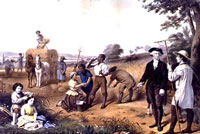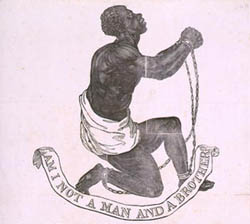The Humane Slave-driver
Up top of a good post from AllyWorks on some of the idiot arguments favored by slavery apologists, there’s an excellent quote from Eric Miller at blackprof.com (2006-03-04), on something that I’ve been concerned about for a while now:
Similarly, slavery- and segregation-denial seeks to create a counter-myth of America, one that reconstructs the South, the Klan, and the Confederate flags as the culture-blind symbols of a distinct region with its own traditions. Slavery- and segregation-denial is an attempt to rewrite history in a manner that minimizes whites' active or passive participation in the state-sponsored violence that lasted well into the 1960s (some would say much later).
Such a critique makes clear that in celebrating the
heroesor symbols of the Confederacy or a variety of other institutions, without acknowledging their racism and the violence that they perpetrated, promoted, or permitted, Justice Parker and his ilk are intent on denying or minimizing acts of extreme violence or genocide.
One popular form of slavery denial is the to single out some historical slave-driver or another, whom we are supposed to like for some other reasons — such as George Washington, or Thomas Jefferson, or Robert E. Lee — and to praise them for their inerringly humane treatment
of their slaves (or at least, their public advocacy of humane treatment
for slaves). For example, here’s the National Park Service on what they teach the young students at the Arlington plantation site, in commemoration of the fiefdom of the Custises and the Lees:
The Custis and Lee families provided their slaves with a rudimentary education, spending money, and specialized medical care. Complex relations between owner and slave are also examined. For her slave Selina Gray, Mary Custis Lee arranged an elaborate wedding ceremony, which was conducted by an Episcopal priest in the same room where Mrs. Lee herself had been married. As students attempt to reconcile the inherently exploitive nature of slavery with examples of humane treatment that existed at Arlington, they begin to realize that some of the questions raised during the program have no answers.
Here’s how Lee himself indignantly replied to charges that he had Wesley Norris, Mary Norris, and their cousin George lashed, and their lacerated backs rubbed with brine, after they tried to leave and were recaptured in Maryland:
… this slander ... There is not a word of truth in it. ... No servant, soldier, or citizen that was ever employed by me can with truth charge me with bad treatment.
— Robert E. Lee to E. S. Quirk, Lexington, March 1, 1866, Virginia Historical Society (reprinted in Fellman 2000).

Master George, humanely
farming
And here’s what WikiPedia made of George Washington’s views on slavery a few days ago. They’re referring to his public advocacy of violent punishments for slaves that were less harsh and unrestrained, less stingy provisions for slaves’ food and shelter, and work-loads for field slaves that were lighter, than what some of his fellow slave-driving whites advocated:
Historians’ perceptions of Washington’s stand on slavery tend to be mixed. Although he advocated humane treatment of his slaves, according to an eyewitness, his slaves lived in
miserablehuts, and were often poorly clothed, according to plantation records.— Washington and slavery, at WikiPedia: George Washington (revision as of 20:23, 18 March 2006)
The problem with this kind of talk is, of course, that the only way to treat slaves humanely is to stop enslaving them. No matter how restrained or unrestrained the punishments used, no matter how aloof or how domineering the style of slave-driving that the slaver adopts, no matter how bountiful or how meagre the rations or the medical care or the opportunities for education, slavery requires physically confining people against their will, forcing them to work without their consent, taking for yourself the profits that they earned by their own sweat and blood, asserting authority over their lives and livelihoods, and using intimidation and physical violence to compel, restrain, or punish those who defy your dictates. That’s what the word slavery
means; it means kidnapping, robbery, assault, and tyranny.
Lee, and Washington, and Jefferson, all had it within their power to stop enslaving their slaves. They could be manumitted; and even before they were formally manumitted there was nothing at all to stop slavers from treating them as free farmers, with a right to work on their own tasks according to their own schedule, and free to come and go as they please. It’s an option that they mostly didn’t avail themselves of: Lee avoided doing that for as long as he could legally get away with it. Washington avoided it for his whole life, only offering freedom to his slaves in his will after both his death and Martha’s. Jefferson couldn’t even bring himself to have his will provide for it after his death. Any claim that these men advocated humane
treatment of slaves is nothing more and nothing less than a sentimental lie, based on some particularly noxious forms of Moonlight-and-Magnolias nostalgia.
Here’s George Orwell, in Politics and the English Language:
I said earlier that the decadence of our language is probably curable. Those who deny this would argue, if they produced an argument at all, that language merely reflects existing social conditions, and that we cannot influence its development by any direct tinkering with words and constructions. So far as the general tone or spirit of a language goes, this may be true, but it is not true in detail. Silly words and expressions have often disappeared, not through any evolutionary process but owing to the conscious action of a minority. Two recent examples were explore every avenue and leave no stone unturned, which were killed by the jeers of a few journalists. There is a long list of flyblown metaphors which could similarly be got rid of if enough people would interest themselves in the job; and it should also be possible to laugh the not un- formation out of existence, to reduce the amount of Latin and Greek in the average sentence, to drive out foreign phrases and strayed scientific words, and, in general, to make pretentiousness unfashionable.
I can think of a long list of phrases that merit a co-ordinated jeering campaign, and humane treatment of slaves
is as good a candidate as any for the top of the list. It deserves public, explicit contempt; where we see it, we ought to ridicule it, or — depending on the format — excise it.
For example, consider my revision of the WikiPedia article on George Washington:
Revision as of 20:23, 18 March 2006
Historians’ perceptions of Washington’s stand on slavery tend to be mixed. Although he advocated humane treatment of his slaves, according to an eyewitness, his slaves lived in
miserablehuts, and were often poorly clothed, according to plantation records. …Revision as of 21:32, 18 March 2006
Historians’ perceptions of Washington’s stand on slavery tend to be mixed. He publicly advocated milder punishments and lighter workloads for slaves than some of his slaveholding contemporaries, but according to an eyewitness, his slaves lived in “miserable” huts, and were often poorly clothed, according to plantation records.
— WikiPedia: George Washington, differences between revision 44400066 and revision 44408684
My revision excises the morally bankrupt, slavery-denying myth of humane treatment,
and replaces it with a short, unvarnished description that simply spells out the specific practices Washington advocated. Now let’s watch as this change becomes a matter of controversy, and as a couple of other editors object to the use of neutral description over a sentimental, evaluative summary — on Neutral Point of View grounds, no less! Watch as these editors express alarm at how my edits make the sentence 9 words more verbose — and then propose an even longer compromise
sentence to replace it, just so that they can make sure that the word humane
is still used somewhere to describe Washington’s treatment of his slaves. What does the word humane
contribute that’s so important to preserve? (I think I know the answer — but if I’m right about that, then it’s contributing something that’s not part of the purpose of WikiPedia.)
Pushing an agenda? You’re damn right I am. The agenda is giving an unvarnished, objective account of slavery, and the sort of treatment that Washington in particular advocated. That’s WikiPedia’s job; repeating sentimental lies is not.
Nor should it be.
 George Washington was the man who established the American republic. He led the revolutionary army against
the British Empire, he served as the first president, and most importantly he stepped down from power.
George Washington was the man who established the American republic. He led the revolutionary army against
the British Empire, he served as the first president, and most importantly he stepped down from power. You see, the thing about Washington is that while he was busy Not Being a King by returning to
You see, the thing about Washington is that while he was busy Not Being a King by returning to